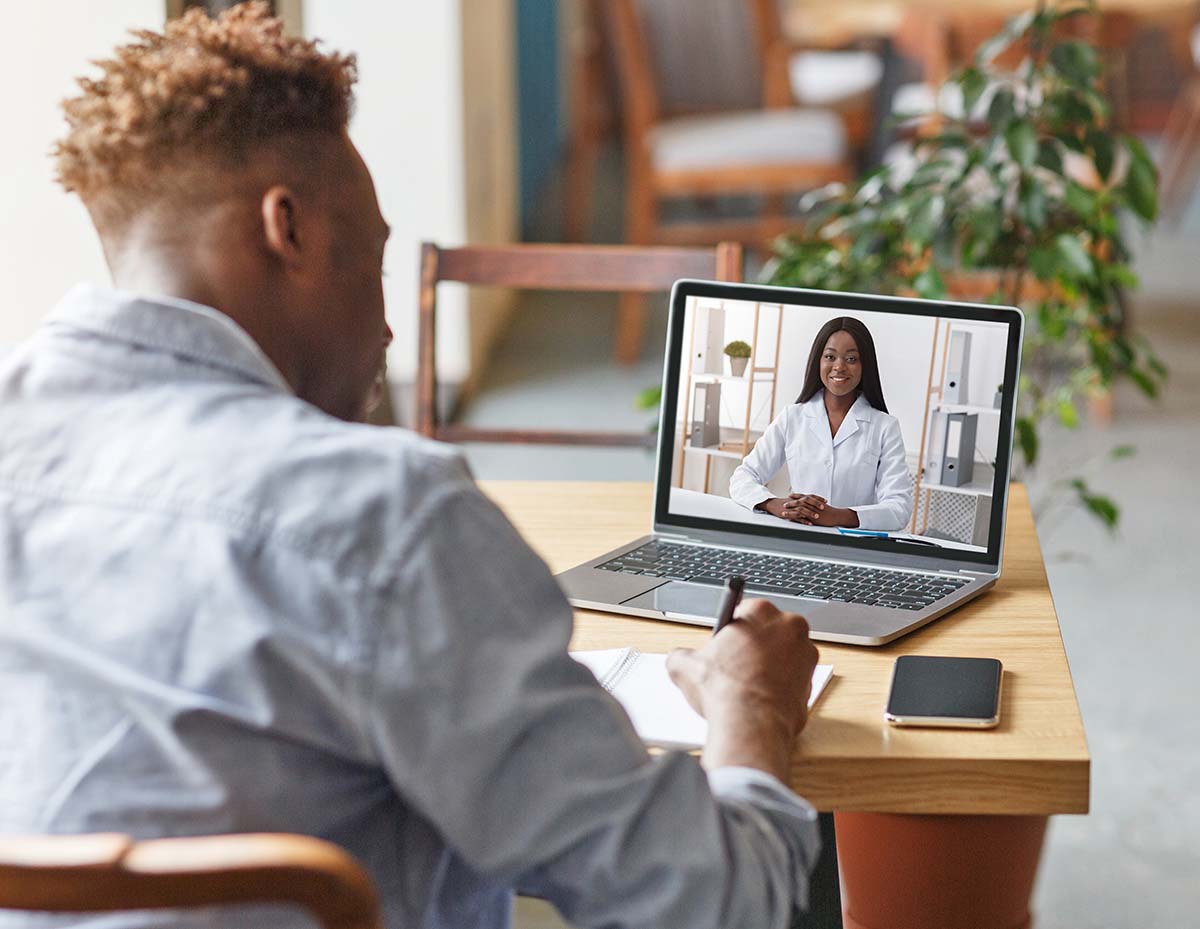As the spouse or partner of a physician, you may not be actually preparing for residency interviews, but it sure does feel like it. Let’s face it, though, you really are… just not directly.
First the good news, at least for the foreseeable future. Many residency and fellowship programs will continue to offer virtual interviews. Besides it being more cost effective (for both you and the medical program), it also gives your spouse/partner the opportunity to schedule more interviews. Anyway, weren’t applications already expensive enough?
Along with this, it definitely allows you to be a bit closer to the process (next room, behind the screen, in the next chair out of screen shot) if you want. This gives you some fairly intricate insight into how these interviews work, thus allowing you to give your spouse/partner much needed support during the interview season. Why is that important? As a spouse/partner of a physician, making these types of decisions do not occur in a silo. They’re discussed and decided with you as the spouse/partner. How much easier is that if you have more details than not?
All that being said, check out some ways you can have a positive impact on preparing your spouse/partner for the interview season:
Preparing for the Residency Interview
Spouses and partners can feel fairly helpless when it comes to helping prepare for the academic portions of a residency interview. That doesn’t mean we can’t help. Aside from the everyday support and encouragement you’re providing now, here are some simple ways you can help your partner shine during the interview process.
Help Find a Place in Your Home with Good Lighting and No Distractions
Purchasing a ring light will be the easiest part of this equation. They’re inexpensive and a great addition to any online meeting. Minimizing distractions and noise is another story. If you have small children or pets it will be easiest to leave the house during the actual interview. Think ahead and have a plan to go to the park, have lunch with a friend, or head to the grandparents’ house. The ultimate goal here is little to no distractions.
If there’s a hiccup in the interview because of noise (i.e. you couldn’t get the dog out of the house and now he’s barking at the mailman), tell your partner not to panic. Act natural. Life happens. Remind them to make it a moment and try to relate to the person interviewing them. Maybe the hiccup will be a bonding moment.
Help Your Partner Discuss Their Qualities Outside of Their Resume
Your partner won’t only need to discuss his/her clinical skills during the interview, they’ll need to be prepared to talk about themself. Start helping them organize their thoughts by discussing their life goals, interests/hobbies, and what they’re looking forward to experiencing as part of a particular medical program. Write down all of your partner’s qualities and don’t forget to talk to their friends to find out what great attributes others see in him/her. Not only will this help to prepare for what will be said in the interview, it will give them a much-needed boost in confidence.
While test scores and grades may be referenced in the application, their personality only gets time to shine while they’re interacting with the people in the program. Remind them to not take themselves too seriously.
Remember, they only get one chance to make a good first impression. The time to show off their winning personality and characteristics is now.
Ask Yourselves: What Are You Looking for in a Medical Program?
As a spouse or partner potentially moving away from friends and family, this aspect could make or break your family’s decision about a match location. It’s always a good idea to sit down as a couple & honestly discuss these aspects of residency prior to interview season. Make it a date night (or two) and envision your “ideal” situation. Even though medical programs may not be able to meet all of your criteria, you can use that framework to personalize your questions for the interview program.
What Would Bring Us the Most Joy Outside of work?
It’s time to ask yourselves some important questions about how you live and what you enjoy doing. Do you and your partner enjoy the hustle and bustle of a big city or do you enjoy the tranquility of a more rural area? Are you foodies or do you like to cook at home? Is it important that you have family and friends near or are you both ready to leave the nest and take off on an adventure? Do you mostly hang out with friends or do you like to do things by yourselves? Although residency can be tough to get through for the entire family, it’s also an opportunity to explore new cities and spend time really enjoying new experiences outside the home.
How Do I Achieve That Now and How Can I Achieve That During Residency?
If you’re with your spouse/partner while they’re in medical school, you’re already likely a bit of an independent person. This independence will be tested next June when your spouse will be in the hospital training over 80+ hours/week and completely exhausted when they get home. It’s important for you to identify how you spend your time now and how you plan to spend your time when your spouse is at work. How will that translate? Will it translate or will you need to make adjustments? Planning ahead for this aspect of residency can oftentimes be overlooked; however, it is crucial for both your wellness and the wellness of your doctor partner.
What Are Our Absolute “Musts”?
Maybe the need to have family around for the next four years is one thing you cannot do without. Or you absolutely can’t be somewhere that doesn’t have a local art scene. These are things you need to get on the table before you make any final decisions about residency locations.
In that same vein, it’s important to talk about what would be nice, but what could you also live without?
How important is it for us to have a strong community for partners?
We’ve heard it time and time again. Making friends as an adult can be very difficult. This is why we connect physician spouses and partners with each other locally through The MedCommons Circle. But when medical programs provide a community for spouses and partners, it can provide an overwhelming sense of belonging when you don’t have friends and family around. Oftentimes they have organized events and built-in support systems to help make residency a bit easier on spouses and partners. This may be something that is important to both of you. If so, be sure to ask about any programs the hospital has in place.
Try to Find Personality in a Medical Program
By the time interviews are scheduled, you’ve done the work by talking through all the topic ideas we’ve laid out. Now’s the time to ask the right questions to find out if the “personality” of the program fits with your family.
Here are some non-medical related questions your partner can ask to help answer whether the program is the right fit:
- What kinds of things do most of the residents do outside of work?
- I’m really passionate about ______. Is anyone else in the program interested in ____?
- How much time do residents have to spend together doing ______?
- Do you all see each other outside of work frequently? Are families included?
- What are some of the best ways to maximize our time living here?
- What has been your favorite part about living in this town/city?
- What does the call/holiday schedule look like?
- Can you tell me about your community for spouses and partners?
- Does your program offer childcare that works with the resident’s early working hours?
Go Forth and Prosper!
Medical programs do a great job of explaining what life is like inside the hospital during training, but they often miss the mark when they have the opportunity to sell their location, community and life outside the hospital.
It’s up to you and your partner to spend the time drilling down the answers to these questions. This will help you both make the best decision for your family.
Doing the legwork now will help you and your physician spouse/partner better acclimate to your new medical program and community. Firsts can be intimidating and isolating. Going through a thoughtful process upfront helps ease such an experience and helps set you up for a more positive transition to this new life.
Just remember, while intense, this is an exciting time in your life. You got this!
Other articles that may interest you:
10 Questions To Ask Residency Programs
Residency Interviews to MATCH Day: What To Do With The Time In Between



